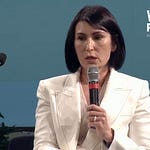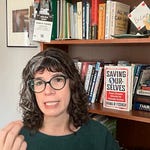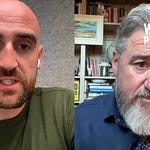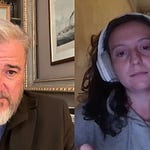If you’d told me two years ago that Wicked Problems would one day involve hanging out at the Vatican with the Pope, Arnold Schwarzenegger, and Bill McKibben – talking climate politics – I’d have asked what you were smoking.
Then again, if 20 years ago you’d told me an American Pope would lead the Catholic Church as a staunch defender of climate science against a fossil-fuelled global authoritarian reaction led by Donald Trump and a Catholic vice president whose views on Catholicism are so odd he’s been rebuked by two popes in a year, I’d have moved to a different seat on the bus and get off at the next stop.
But here we are.
This is the first instalment of Climate Pilgrim, our new project under the Wicked Problems banner: an invitation to come with me on a walk through the borderlands of faith, moral imagination, and climate reality.
Wicked Problems started as a public way of asking people a lot smarter than me to help make sense of the tangle of technology, finance, politics, economics and culture that got us into this climate mess and also offers ways through it. Climate Pilgrim will be, I hope, a good-faith effort to explore the deeper questions of meaning and our relationships with each other and our relationships with nature.
Thankfully that week in Rome - sparked by my conversation with Dr. Lorna Gold of the Laudato Si’ Movement - gave us plenty to think about and a head start with a raft of conversations with people I think you’ll want to hear from.
So: episode one. A crossover special. With a sampler of conversations we had in Rome at the Raising Hope conference marking the tenth anniversary of Laudato Si’, Pope Francis’ landmark encyclical on “care for our common home.” Only this time the speaker is his successor – Pope Leo XIV, formerly “Bob from Chicago,” – delivering his first major climate address. And standing beside him on stage? Arnold Schwarzenegger, declaring there are “1.4 billion Catholics out there who can help us terminate pollution.”
The Pope, for his part, was calm – but pointed. Quoting his predecessor, he warned against those who “deride the increasingly evident signs of climate change to ridicule those who speak of global warming, and even to blame the poor for the very thing that affects them the most,” and urged citizens to pressure governments for “rigorous regulations and controls.” It was continuity with Francis, but recognising that we’re 10 years into knowing what we have to do but still failing to do it:
We must shift from collecting data to caring and from environmental discourse to an ecological conversion that transforms both personal and communal lifestyles. For believers, this conversion is in fact no different to the one that orients us towards the living God.
We cannot love God, whom we cannot see, while despising his creatures.
That stayed with me, but I wondered how new or different it sounded to a veteran Vatican-watcher who also could give a sense of how those comments from an American pope went down back in the US. So I asked Colleen Dulle, Vatican correspondent for America Magazine, co-host of the Inside the Vatican podcast, and author of the memoir Struck Down, Not Destroyed, to join me for the kickoff episode. No one alive is better at translating Vatican nuance into plain English – or holding onto faith while reporting on its failings. Our talk ranged from papal climate diplomacy to why New Orleans memes its way through apocalypse, and why a generation raised on scandal might still be searching for meaning.
Colleen reminded me that when Laudato Si’ appeared in 2015, it measurably shifted U.S. Catholics’ views on climate. Two Princeton researchers found that after reading it, American Catholics were more likely to see global warming as real – and as a moral issue. Words from a pope still matter. And Leo XIV, she noted, seems to know that: he switches into English when he wants American media to pay attention.
If he turns up at COP 30 in Belém next month – as Brazil’s Marina Silva urged him to do from the stage, to cheers – expect headlines. He would, after all, be the most senior American on site.
Our conversation also dug into how “structures of sin” – a term the Church uses for systems that have made virtues of selfishness and alienation – mirror the systems driving ecological collapse. The Church now calls the climate crisis and the neglect of the poor two faces of the same failure to love. That moral framing lands differently than talking parts per million or gigatonnes of CO₂. It cuts closer to the bone: business as usual isn’t just unwise. It’s wrong.
Colleen’s own story brings that tension home. She began covering the Vatican during the 2018 abuse crisis – a front-row seat to betrayal – and yet somehow still believes. Her book is about staying on the tightrope: yelling at God one minute, praying the next, and reporting in between. That kind of honest faith feels like what this moment needs – not piety, but persistence.
In Climate Pilgrim we’ll be talking with people of all faiths and none who share that spirit: the ones turning hope from words into work. Future episodes will bring you South Africa’s Kumi Naidoo on the Fossil Fuel Non-Proliferation Treaty; Tuvalu Climate Minister Maina Talia; Bishop Martin Hayes of Kilmore, Ireland on climate obligations as official Catholic social teaching - not a passing fad; Ukraine’s Svitlana Romanko on faith versus fossil-fueled authoritarianism; Ireland’s former environment minister Eamon Ryan on his post-politics climate career; and Graham Sinclair - an LSE-trained Anglican priest breathing new life into church properties to turn around inner cities.
With tons of other conversations that started in Rome and I plan to come back to.
You can start checking out those conversations with this one with Kumi Naido:
So no, Wicked Problems hasn’t gone all holy. We’re just following the story where it leads. And right now it leads through Rome, Belém, and every other place where people are re-examining what they owe each other and the world they pass on as an inheritance. You can call that faith, or politics, or just reality.
PS - I did bring home a bottle of the melted Greenland ice Pope Leo blessed – “Pope Juice,” my wife calls it. I keep it on my desk as a reminder that even the most ancient institutions are melting into something new.
PPS - We do still love some exit music. This one we’re taking back from the fash.














